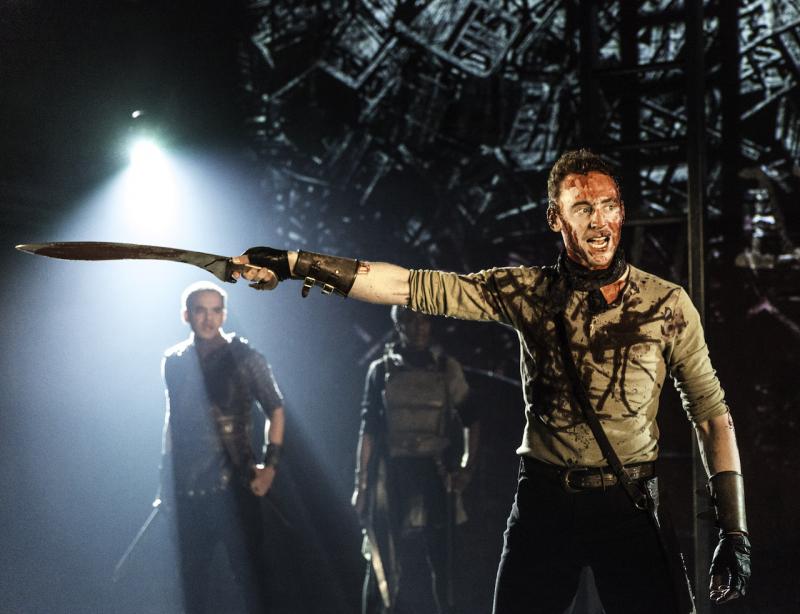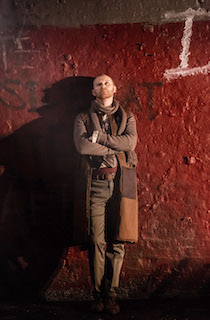Coriolanus, National Theatre at Home review – gritty 21st century update | reviews, news & interviews
Coriolanus, National Theatre at Home review – gritty 21st century update
Coriolanus, National Theatre at Home review – gritty 21st century update
The power of the mob still resonates in a production that speaks powerfully to our times

An arrogant leader contemptuous of his people. Could there be a more perfect timing for Josie Rourke’s taut, visceral production of Coriolanus?
Yet it’s also, of course, a demonstration that one factor that defines a classic is its ability to reflect different tensions at different times. Tom Hiddleston’s scornful, muscular performance in the title role was conceived in 2013, just a couple of years after the Occupy Movement had shown what could happen when the 99% demanded accountability from one per cent.
Shakespeare’s own text was written, most scholars believe, in the wake of the 1607 Midland Revolt. This saw thousands rioting to protest against wealthy landowners absorbing communal farms in the “enclosure of common land”. Today we live with the paradox that dissatisfaction with the elite has led to a government controlled by public-school populists. Yet the power of the mob still resonates and part of this play’s appeal is connected to the fact that we are all tantalised as to what chapter it might provoke next.
It’s a reflection of its Occupy roots that the aesthetic of this Donmar production is grittily urban. On Lucy Osborne’s stark set, the Roman forum is outlined by a blood-red square on the floor. Graffiti artists spray Latin slogans on the wall, while both the armour of the Romans and the outfits of the mob would not look out of place in a twenty-first century street riot.
 This brings significant oomph to a work which – despite being described by TS Eliot as superior to Hamlet – is one of Shakespeare’s more difficult tragedies to stage. This is not least because its central figure’s ruthless suppression of his vulnerability means he does not indulge in soliloquies. Another fascinating aspect of O’Rourke’s production, then, is to make us realise that there is a route into his interior life. Yet we witness it not through Coriolanus but through the pained love of those closest to him.
This brings significant oomph to a work which – despite being described by TS Eliot as superior to Hamlet – is one of Shakespeare’s more difficult tragedies to stage. This is not least because its central figure’s ruthless suppression of his vulnerability means he does not indulge in soliloquies. Another fascinating aspect of O’Rourke’s production, then, is to make us realise that there is a route into his interior life. Yet we witness it not through Coriolanus but through the pained love of those closest to him.
His mother, Volumnia, would famously lead any pack of tiger mothers, and Deborah Findlay’s stunningly modulated interpretation of the role shows her transition from arch superiority to heartbroken horror as she realises the danger of her son’s intransigence. As his wife Virgilia, Borgen’s Birgitte Hjort Sørensen demonstrates both quiet rage and empathetic dignity when she speaks. Beyond this the strong physical chemistry between her and Hiddleston’s Coriolanus pays testimony to his ability to inspire love, creating a potent subtext of the warmth that he never demonstrates in public.
Mark Gatiss’s excellent Menenius (pictured above) adds still another layer to this emotional portrait. Famously Gatiss drew strongly on Peter Mandelson for inspiration in his role as Sherlock’s brother, Mycroft, and here he comfortably inhabits the role of another silver-tongued statesman. Yet beneath the wit as he tries, in vain, to coach Hiddleston’s stonily dignified Coriolanus to appeal to the people, we also see how devastated he is as he watches a friend with genuine merits destroying himself by refusing to play political games.
When it comes to Coriolanus’s detractors, in a nice sleight of gender-blind casting, Sicinius, tribune of the people becomes Sicinia, played by an appropriately Machiavellian Helen Schlesinger. Together with fellow tribune, Brutus, played with urbane duplicity by the consistently superb Elliot Levey, she shows how close the tribunes are to contemporary political manipulators, as they bitch and calculate how to stir the world around them into flames.
Next to the complex emotional portrayal of the struggles that Coriolanus undergoes with his own people, the play’s other dominant conflict, between himself and the Volscian leader Tullus Aufidius, feels less nuanced. Hadley Fraser is an impressive presence as Aufidius, but even the playing up of the homosexual connection between the two men doesn’t make their relationship compelling. The magnetic dignity of Hiddleston’s performance is most interesting when shown against the motivations of those trying to save him. They reveal that unusually for Shakespeare, what’s most powerful in this play is what’s left unsaid, that the posturing and arrogant rhetoric are an expression of emotional wounds only recognised when it’s too late for them to heal.
- Free on the National Theatre's YouTube channel till 11 June
- More theatre reviews on theartsdesk
The future of Arts Journalism
You can stop theartsdesk.com closing!
We urgently need financing to survive. Our fundraising drive has thus far raised £49,000 but we need to reach £100,000 or we will be forced to close. Please contribute here: https://gofund.me/c3f6033d
And if you can forward this information to anyone who might assist, we’d be grateful.

Subscribe to theartsdesk.com
Thank you for continuing to read our work on theartsdesk.com. For unlimited access to every article in its entirety, including our archive of more than 15,000 pieces, we're asking for £5 per month or £40 per year. We feel it's a very good deal, and hope you do too.
To take a subscription now simply click here.
And if you're looking for that extra gift for a friend or family member, why not treat them to a theartsdesk.com gift subscription?
more Theatre
 Ragdoll, Jermyn Street Theatre review - compelling and emotionally truthful
Katherine Moar returns with a Patty Hearst-inspired follow up to her debut hit 'Farm Hall'
Ragdoll, Jermyn Street Theatre review - compelling and emotionally truthful
Katherine Moar returns with a Patty Hearst-inspired follow up to her debut hit 'Farm Hall'
 Troilus and Cressida, Globe Theatre review - a 'problem play' with added problems
Raucous and carnivalesque, but also ugly and incomprehensible
Troilus and Cressida, Globe Theatre review - a 'problem play' with added problems
Raucous and carnivalesque, but also ugly and incomprehensible
 Clarkston, Trafalgar Theatre review - two lads on a road to nowhere
Netflix star, Joe Locke, is the selling point of a production that needs one
Clarkston, Trafalgar Theatre review - two lads on a road to nowhere
Netflix star, Joe Locke, is the selling point of a production that needs one
 Ghost Stories, Peacock Theatre review - spirited staging but short on scares
Impressive spectacle saves an ageing show in an unsuitable venue
Ghost Stories, Peacock Theatre review - spirited staging but short on scares
Impressive spectacle saves an ageing show in an unsuitable venue
 Hamlet, National Theatre review - turning tragedy to comedy is no joke
Hiran Abeyeskera’s childlike prince falls flat in a mixed production
Hamlet, National Theatre review - turning tragedy to comedy is no joke
Hiran Abeyeskera’s childlike prince falls flat in a mixed production
 Rohtko, Barbican review - postmodern meditation on fake and authentic art is less than the sum of its parts
Łukasz Twarkowski's production dazzles without illuminating
Rohtko, Barbican review - postmodern meditation on fake and authentic art is less than the sum of its parts
Łukasz Twarkowski's production dazzles without illuminating
 Lee, Park Theatre review - Lee Krasner looks back on her life as an artist
Informative and interesting, the play's format limits its potential
Lee, Park Theatre review - Lee Krasner looks back on her life as an artist
Informative and interesting, the play's format limits its potential
 Measure for Measure, RSC, Stratford review - 'problem play' has no problem with relevance
Shakespeare, in this adaptation, is at his most perceptive
Measure for Measure, RSC, Stratford review - 'problem play' has no problem with relevance
Shakespeare, in this adaptation, is at his most perceptive
 The Importance of Being Earnest, Noël Coward Theatre review - dazzling and delightful queer fest
West End transfer of National Theatre hit stars Stephen Fry and Olly Alexander
The Importance of Being Earnest, Noël Coward Theatre review - dazzling and delightful queer fest
West End transfer of National Theatre hit stars Stephen Fry and Olly Alexander
 Get Down Tonight, Charing Cross Theatre review - glitz and hits from the 70s
If you love the songs of KC and the Sunshine Band, Please Do Go!
Get Down Tonight, Charing Cross Theatre review - glitz and hits from the 70s
If you love the songs of KC and the Sunshine Band, Please Do Go!
 Punch, Apollo Theatre review - powerful play about the strength of redemption
James Graham's play transfixes the audience at every stage
Punch, Apollo Theatre review - powerful play about the strength of redemption
James Graham's play transfixes the audience at every stage
 The Billionaire Inside Your Head, Hampstead Theatre review - a map of a man with OCD
Will Lord's promising debut burdens a fine cast with too much dialogue
The Billionaire Inside Your Head, Hampstead Theatre review - a map of a man with OCD
Will Lord's promising debut burdens a fine cast with too much dialogue

Add comment